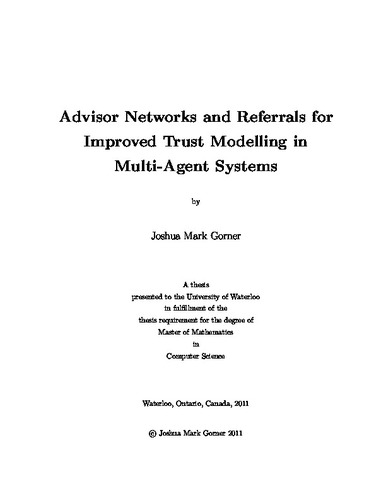| dc.description.abstract | This thesis relates to the usage of trust modelling in multi-agent systems - environments in which there are interacting software agents representing various users (for example, buyers and sellers exchanging products and services in an electronic marketplace). In such applications, trust modelling may be crucial to allow one group of agents (in the e-commerce scenario, buyers) to make effective decisions about which other agents (i.e., sellers) are the most appropriate partners. A number of existing multi-agent trust models have been proposed in the literature to help buyers accurately select the most trustworthy sellers.
Our contribution is to propose several modifications that can be applied to existing probabilistic multi-agent trust models. First, we examine how the accuracy of the model can be improved by limiting the network to a portion of the population consisting of the most trustworthy agents, such that the less trustworthy contributions of the remaining agents can be ignored. In particular, we explore how this can be accomplished by either setting a maximum size for a buyer's advisor network or setting a minimum trustworthiness threshold for agents to be accepted into that advisor network, and develop methods for appropriately selecting the values to limit the network size. We demonstrate that for two models, both the Personalized Trust Model (PTM) developed by Zhang as well as TRAVOS, these approaches will yield significant improvements to the accuracy of the trust model, as opposed to using an unrestricted advisor network.
Our final proposed modification is to use an advisor referral system in combination with one of the network-limiting approaches. This would ensure that if a particular agent within the advisor network had not met a specified level of experience with the seller under consideration, it could be replaced by another agent that had greater experience with that seller, which should in turn allow for a more accurate modelling of the seller's trustworthiness. We present a particular approach for replacing advisors, and show that this will yield additional improvements in trust-modelling accuracy with both PTM and TRAVOS, especially if the limiting step were such that it would yield a very small advisor network.
We believe that these techniques will be very useful for trust researchers seeking to improve the accuracy of their own trust models, and to that end we explain how other researchers could apply these modifications themselves, in order to identify the optimal parameters for their usage. We discuss as well the value of our proposals for identifying an "optimal" size for a social network, and the use of referral systems, for researchers in other areas of artificial intelligence. | en |

